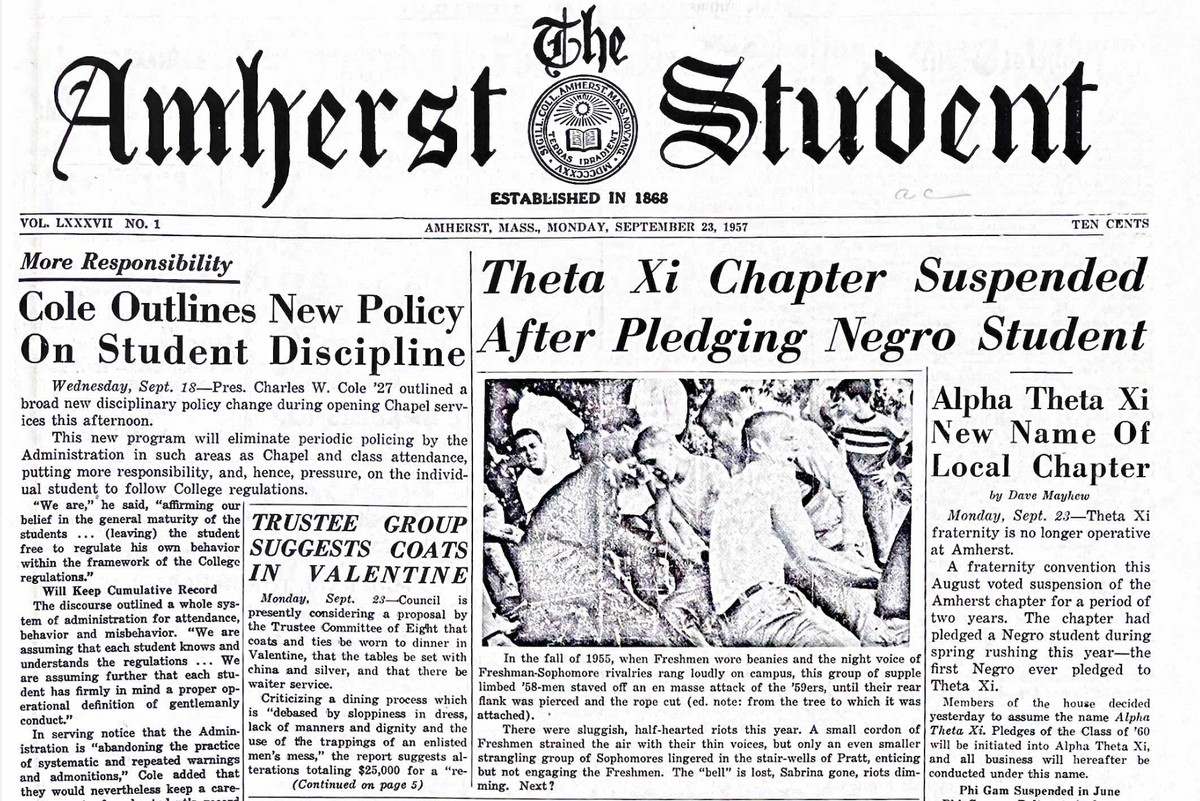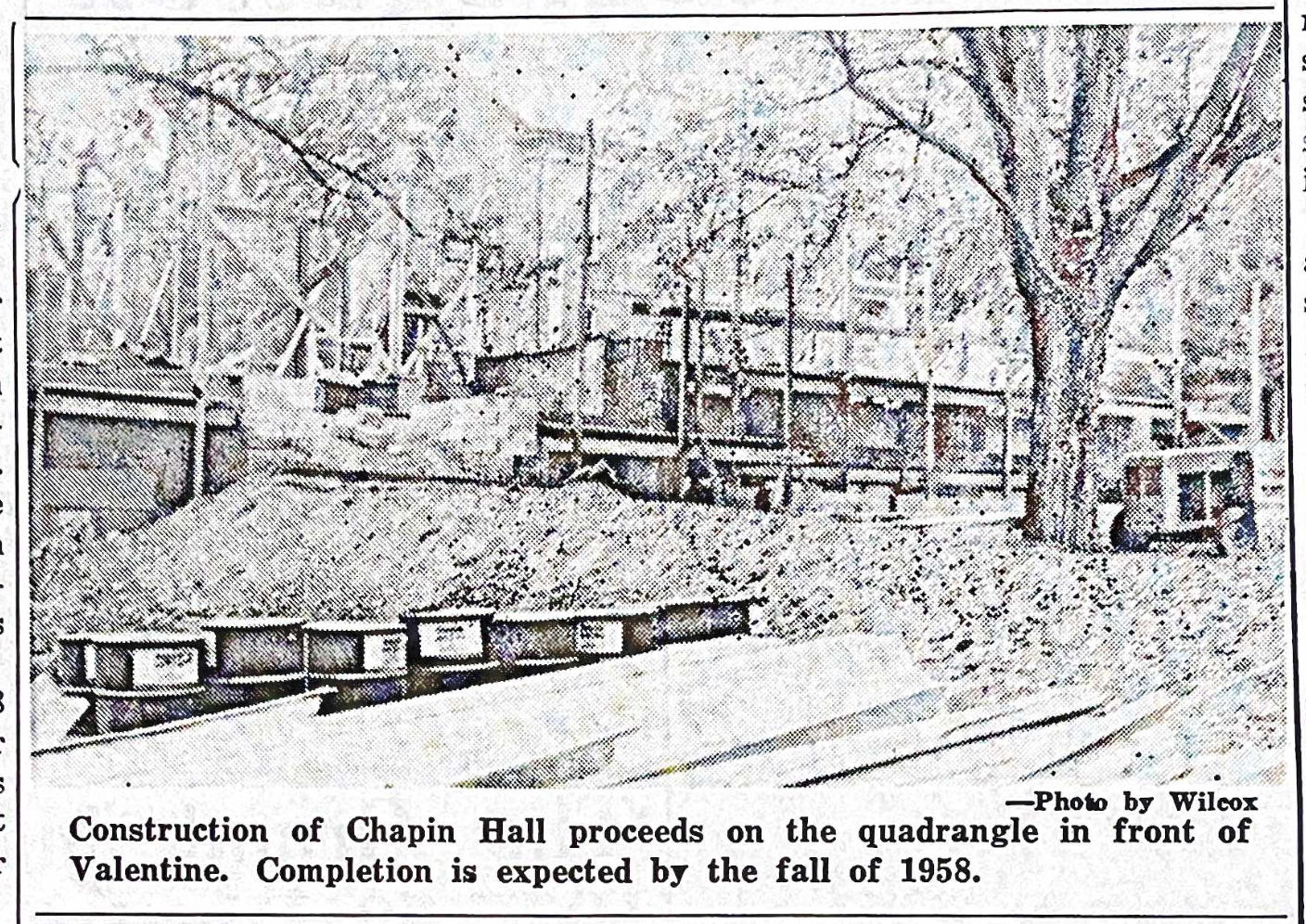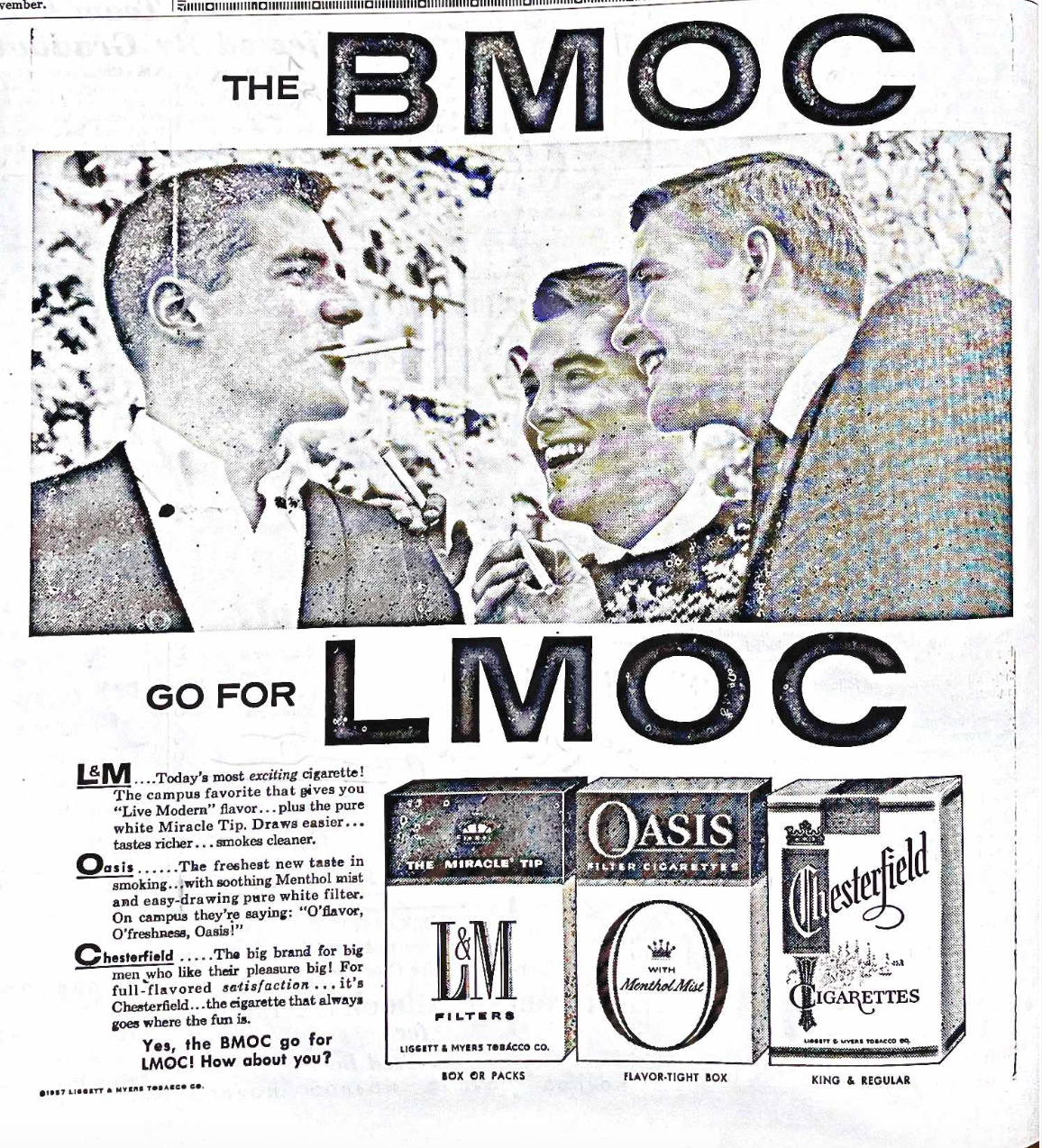Old News: This Week in 1957
This week in Old News, Managing Features Editor Sonia Chajet Wides ’25 takes a look at how national issues like integration and McCarthyism came up on campus in 1957.

Each week in Old News, I use a random number generator to select a year in the college’s history and take a look at The Student’s issue from this week in that year.
This Week’s Year: Sept. 23, 1957
In September 1957, the nation focused its attention on turmoil in Little Rock, Arkansas, where nine Black students were set to begin the school year at the all-white Central High School — three years after the city’s school board had pledged to desegregate its schools in accordance with the Brown v. Board of Education decision.
As many of us know, throughout the first week of school, the nine students were unable to enter the building, faced with angry racist mobs and armed soldiers sent by the belligerent segregationist Governor Orval Faubus. Finally, on Sept. 25, 1957, President Dwight Eisenhower sent National Guard soldiers and troops from the U.S. Army to Little Rock to personally escort the “Little Rock Nine” into the building. While the harassment and violence that the students would face was far from over, the nation watched as the federal mandate of integration interrupted segregationist local power.
This week’s Old News looks at the issue of The Amherst Student from Sept. 23, 1957, the first of that school year. As the community of Amherst looked to Little Rock, they also experienced, in the words of one article, “a curious inversion of the Arkansas situation.” Over the summer, multiple Amherst fraternities had been suspended by their frats’ national governing bodies after they pledged Black students to their chapters. Multiple Amherst frats were starting the ’57-58 school year as independent local chapters “in order to rid themselves of racial restrictions imposed by their national organizations.”
This news was not the only example of how national and global politics manifested themselves at Amherst that fall. This edition of The Student touches upon encounters with McCarthyism, domestic and international perspectives on segregation, and army draft deferral tips. Alongside this, “regular” college life raged on.
Amherst Theta Xi chapter suspended after pledging a Black student: The front page of The Student declared, “Struggles over racial discrimination and local autonomy were by no means confined to the national news scene this past summer, for these same problems were encountered by several Amherst national fraternities in their summer conventions.”
Namely, the Theta Xi fraternity was suspended by its national governing body after it pledged a Black student that past spring, the first in the fraternity’s history. Amherst’s Theta Xi was to be renamed Alpha Theta Xi, an independent local chapter.
Theta Xi wasn’t the only one — Phi Gamma Delta was also suspended in June “under similar circumstances.” Theta Xi, Phi Gamma Delta, and other fraternities, like Beta Theta Pi and Chi Psi, all sought to expand local chapter autonomy at their respective national conventions over the summer.
It was at one such August convention that the national Theta Xi ruling body voted to suspend the Amherst chapter. The article details that “the grounds for the Theta Xi suspension were nebulous and contained no direct reference” to integration, but made clear that it was the cause for punishment. Peter Parker ’58 was quoted saying that there was “almost no chance of reinstatement.” The chapter would not pay dues and proceed without using the name, rituals, or constitution of the national fraternity.
At the convention, the Amherst Theta Xi chapter supported a resolution calling for local autonomy in member selection. Several chapters from other colleges, mainly in the North, joined the resolution, citing that the national segregationist guidelines went against their college trustees’ decisions to forbid racial discrimination in frat houses. Amherst’s trustees, for example, had ruled against discrimination in pledging in 1946. National alumni at the conference advocated that “Theta Xi should be willing to sacrifice these northern chapters in order to retain its racial homogeneity,” even if the financial standing of the national organization would suffer. The precedent set by the Amherst case meant that “a considerable number of Northern chapters … could be forced to sever their connections with Theta Xi.”
Other Amherst fraternities attempted similar, and similarly unsupported measures for local autonomy at their respective conventions.
Theta Xi was reported to “cheerfully accept” their local status as a mark of independence.
“Federal Agents Investigate Subversive Committee of 14”: At the time, a “Committee of 14” students was carrying out a survey to explore the “merits and demerits of the present Chapel system,” which, sometimes mandatorily, hosted students for lectures and events. Specifically, the Committee sought opinions on whether the administration should release advance notice of Chapel lecture topics. This seemingly innocuous mission was interrupted over the summer by a McCarthyist-era federal investigation: When the committee sent questionnaires to recent alumni, “it so happen[ed]... that one alumnus was undergoing a loyalty check, and his mail was being opened by a government organization.” The U.S. Government, designating the Committee of 14 as “suspicious sounding,” commenced an investigation and the college dean and registrar had to provide explanations to convince federal agents of “the harmless intentions of the group.” This small, casual detail — “one alumnus was undergoing a loyalty check” — is indicative of the context of McCarthyism and the Red Scare.

“The Tonal Change”: An editorial commented upon a new student discipline policy. The policy did away with “policing” and consistent warnings about Chapel and class attendance and “affirmed” student maturity. The administration would replace this system with cumulative accounts of student records of attendance. “Students who are ‘clearly not intent on making the most of their opportunities here … will be asked to leave,’” the administration was quoted as saying.
“The new disciplinary system … represents an intelligent and consistent innovation,” the editorial proclaimed, also lauding the upcoming Committee of 14 report and the likely chapel alterations ahead. Those changes weren’t the only ones that lay in wait. President Charles Cole said that students should prepare for “the population crisis [to] hit the colleges in five years” and increase the student-faculty ratio, warning that students may have to sacrifice “the 1000-man college.”
“If we felt the need to preach to the Class of ’61 in an opening editorial,” the board wrote, “We would preach … a willingness to examine traditions and past beliefs in light of changing evidence.”
Book review: One student book review discussed John Barlow Martin’s new book “The Deep South Says ‘Never,’” a look at the hardcore segregationism of whites in South Carolina, Georgia, Alabama, and Mississippi, where Martin claimed that “it now appears that desegregation is wholly impossible.” The review praised Martin’s writing, and followed the book’s journey through the deep South to hear excerpts from racist judges, “liberal Southern editors,” and “paternalistic South Carolina land owners.” That being said, the review “regrets that Mr. Martin does not suggest some means of modifying the present situation.”
Fellow from India writes on U.S. segregation: A column titled “‘The Castles of Caste Among Ourselves’: Indian Student Views U.S. Segregation” was published, marking the first in a series written by Ashakant Nimbark, a fellow at Amherst from Gujarat University in India, who was specializing in sociology and anthropology. The introduction announced that Nimbark’s column would focus on “an attempt to evaluate the present situation in the States … and try to compare it to the caste problem in India.”
Nimbark’s first column mainly established the premise of his series and discussed his observations and learnings about “race problems” from an anthropological and sociological lens — mainly the “finding” of modern social scientists that “racial differences” are “negligible” and that all claims of racial hierarchy have been disproven.
He also referenced the situation in Little Rock and noted the slow progress of integration in the United States, naming the tension between federal and state power as a “consistent roadblock.” The column advised students to look ahead to more thoughts about the U.S. and India from Nimbark in future weeks.
No coat, no service: The Student reported that a group of college trustees had proposed that coats and ties should be worn to dinner in Valentine Dining Hall, and that the tables should be set with china and silver. They also advocated for waiter service. The student council was considering this idea, which was based on trustees’ criticism of “a dining process which is ‘debased by sloppiness in dress, lack of manners and dignity.’”
Construction Updates: One column included miscellaneous updates about construction on campus — including the construction of Chapin Hall, which had continued over the summer.
Ads: Ads featured “Love in the Afternoon” starring Audrey Hepburn at Amherst Cinema — 50 cents for a ticket. There were also numerous cigarette ads, including a note at the end of a sports column, which read: “Double your pleasures at next Saturday’s [football] game by taking along plenty of Marlboros, whose makers bring you this column throughout the school year.”

Water shortage: Coupling fears of overpopulation was the threat of water shortages. The Student reported that the town water table was at its lowest since 1953, and town and college community members were being asked to cull their usage — Pratt Pool sat empty until further notice. They called the drought an “Ever increasing problem … for the town’s water consumption will double by 1965.”
Draft negotiations: With reports that the armed forces were about to cut 100,000 men, the Selective Service System announced that they would hold only one deferment test for college students that year. The test would confirm that students had academic business to conduct and could defer a military draft in case there was one — Associate Dean John C. Esty advised that students, especially those considering graduate school, take the test so that they would have a good chance of staying in college and completing graduate work should mandatory conscription occur. The article speaks to the on-edge Cold War feeling, and interestingly foreshadows the issues of The Student from the ’60s, which often featured draft deferral news and tips during the Vietnam War.
Vaccines: In the face of the threat of an epidemic, Amherst College was to offer inoculations against “Asiatic flu,” an outbreak of influenza in 1957 and 1958. The quotes sounded familiar: “The disease itself is not serious to the individual … the effects are no worse than those of the common cold,” The Student reported. “The disruption that an epidemic would cause in the life of the College is what Dr. Brown hopes to prevent.”
New first-year class: The Student happily reported on the arrival of the class of ’61, which included 253 students, among them 19 valedictorians. There were more students hailing from New York than any other state, with Massachusetts a distant second; there were just seven international students. Many of them had shared high school origins: there were nine freshmen from Deerfield Academy in Massachusetts, and five each from New Trier High School (Illinois), Bethesda Chevy-Chase High School (Maryland), and Exeter Academy (New Hampshire).
The usual “riots” — seemingly games and fights between new freshmen and the sophomore class — were notably “sluggish and half-hearted … this year … A small cordon of Freshmen strained the air with their thin voices, but only an even smaller strangling group of Sophomores lingered in the stair-wells of Pratt, enticing but not engaging the Freshmen.”
The worst of it? The freshmen’s customary beanies were nowhere to be found “due to a shipment failure at Walsh’s, the only authorized seller of the purple and white toppers in town.”





Comments ()